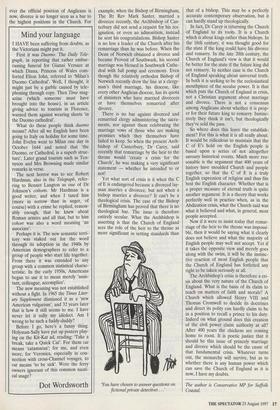Mind your language
I HAVE been suffering from doubts, as the Victorians might put it.
First it was Duomo. The Daily Tele- graph, in reporting that rather embar- rassing funeral for Gianni Versace at which Diana, Princess of Wales com- forted Elton John, referred to 'Milan's Duomo Cathedral'. Well, I thought, it might just be a garble caused by tele- phoning through copy. Then Time mag- azine (which someone must have brought into the house), in an article giving advice to tourists in Florence, warned them against wearing shorts 'in the Duomo cathedral'.
What do these people think duomo means? After all we English have been going to Italy on holiday for some time. John Evelyn went to Milan one day in October 1644 and noted that 'the Duomo, or Cathedral, is a superb struc- ture'. Later grand tourists such as Ten- nyson and Mrs Browning made similar remarks in verse.
The next horror was to see Robert Hardman, also in the Telegraph, refer- ring to Bennet Langton as one of Dr Johnson's cohorts. Mr Hardman is a good writer, and when I taxed him (more in sorrow than in anger, of course) with a crime he replied, reason- ably enough, that he knew about Roman armies and all that, but to him cohort was also a word meaning 'an associate'.
Perhaps it is. The new semantic terri- tory was staked out for the word through its adoption in the 1940s by American demographers to refer to a group of people who start life together. From there it was extended to any group with a common statistical charac- teristic. In the early 1950s, Americans began to use it to mean merely 'assis- tant, colleague, accomplice'. The new meaning was not established without a fight. In 1965 the Times Liter- ary Supplement dismissed it as a' 'new American vulgarism', and 32 years later that is how it still seems to me. I have never let it sully my idiolect. Am I wrong to be such a fuddy-duddy? Before I go, here's a funny thing. Holyman-Sally have put up posters play- ing on the Kit-Kat ad, reading: 'Take a break, take a Quick Cat'. For them cat means 'catamaran': for me, and even more, for Veronica, especially in con- nection with cross-Channel voyages, to cat means 'to be sick'. Were the ferry owners ignorant of this common nauti- cal usage?
Dot Wordsworth


























































 Previous page
Previous page